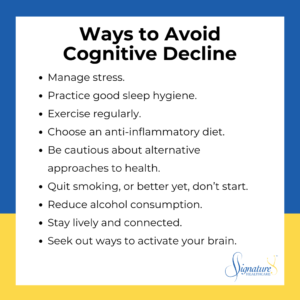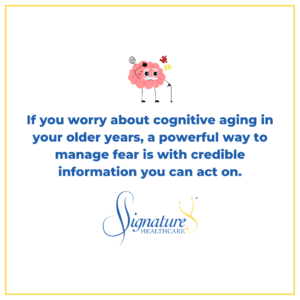Mild Cognitive Impairment: When to Chat With Your Doctor
Oops, your car keys are gone again, and it’s the second time you’ve misplaced them this week.
Losing keys is frustrating and inconvenient for anyone. But if you’re getting into your senior years, it’s common to start worrying about the possible onset of mild cognitive impairment.
With dementia always a hot topic in the news and social media, forgetting our car keys or a neighbor’s name can have us wondering what’s normal mild cognitive impairment and what’s not.
Generally speaking, this bothersome yet relatively mild forgetfulness is nothing to worry about in our 40s, 50s, 60s, and even beyond.
But when is the right time to be concerned? Let’s take a look.
What Is Dementia?
Cognitive decline becomes a concern when our day-to-day activities are impacted by less than optimal performance, typically in more than one area at once — for example, when we forget quite frequently, experience decreased cognitive capacity, and, most critically, start to lose executive function, which is our ability to organize, reason, or make decisions.
When combined, these factors qualify as dementia, which may occur in one of several forms, including:

Can We Avoid Cognitive Decline?
If a patient’s family member has or had dementia, the patient may worry the same is happening to them. They focus intensely on any changes in their cognition, memory, or decision-making, anxious that the changes signal early onset dementia.
Are there genetic links to cognitive impairment, even dementia? Yes. But everyone is unique. It may put your mind at ease to know that, even with genetic susceptibility, you’re not predestined to get the disorder.
Our most important stride in taking control of dementia is to avoid getting it in the first place! Throughout life, there are several ways to minimize the risk of getting dementia in our later years — and to maintain overall excellent health as well:
- Manage stress. It can increase inflammation throughout the body, compromising the function of key systems, organs, and tissues such as the blood vessels feeding our brains. Although often challenging, take steps to minimize stressors in your life and explore healthy ways to manage stress.
- Practice good sleep hygiene. That means taking relatively simple actions to support your getting a good night’s sleep each night, such as turning electronics off at least one hour before bedtime, avoiding caffeine after 3:00 p.m., limiting alcohol intake, and dimming the lights as you approach bedtime. Work with a knowledgeable, compassionate primary care doctor who can help you identify sleep issues and help you get consistent, restorative nightly slumber.
- Exercise regularly. Exercise keeps the brain healthy. Your concierge physician has the time to help you find the right exercise physiologist or develop an individualized program of activity that works best for you.
- Choose an anti-inflammatory diet. Research suggests that adopting the Mediterranean style of eating supports brain function well into our 80s.
- Be cautious about alternative approaches to health. Partner with an integrative medicine doctor who can make sense of all the trends around fasting, vitamins, and supplements and help determine what’s safe and best for you.
- Quit smoking, or better yet, don’t start. Smoking impacts brain health. Your trusted physician can guide you on ways to cut back and introduce you to tools that can even help you quit smoking altogether.
- Reduce alcohol consumption. Regular drinking impacts brain function, too. Recent research shows that no amount of alcohol is safe for overall wellness, including brain health.
- Stay lively and connected. An important lesson from the COVID pandemic: Isolation and loneliness are very bad for our brain health. Particularly as we age, feeling a sense of contribution, purpose, and connection to loved ones and the community supports strong brain health and function.
- Seek out ways to activate your brain. Study a new language, take a class, read a book, or work on crossword or Sudoku puzzles. Challenging our brains throughout life is a smart step toward keeping them active into our senior years.
Years ago, Dr. Dean Ornish speculated that adjustments to diet and lifestyle practices could significantly impact established cardiovascular disease. He applied four care components — healthy diet, regular exercise, stress management, and group support — to people with existing plaque build-up in their coronary arteries.
The results were extraordinary. For most participants, attention to all four interventions stabilized their plaque and reduced it over time, essentially reversing the disease. The doctor later obtained similar results in men with progressed prostate cancer, stabilizing and reducing their risk.
Importantly, Dr. Ornish recently replicated these results in people with established early dementia, a heartening indicator that lifestyle changes can indeed reverse some signs of mild cognitive impairment.
If You Notice Signs of Decline
Our region’s physicians and other practitioners are among the best in the nation. However, traditional healthcare systems pressure physicians to limit the time spent with each patient.
An individual may spend more time in the waiting room than meeting with the doctor. During a speedy 15-minute office visit, the patient has an average of five minutes or so to ask questions or express concerns, so they may feel too rushed to mention signs of declining cognition, memory, or function.
If or when the possibility of mild cognitive impairment arises, visit your trusted concierge physician or integrative medicine practitioner. At Signature Healthcare, we make you comfortable with an unrushed, caring, informed discussion. You have ample time to open up to your doctor and get actionable answers.
We conduct a thorough evaluation, address any fear or anxiety you may have, and involve you as a true partner in your care if further attention is needed. The best conventional medical care offered by your concierge doctor, complemented with an integrative approach, can help support your activity and capacities.
Optimizing Brain Health as We Age and the Power of Good Information
True dementia is a life-changing diagnosis, not just for patients but for family members and caregivers as well. If you worry about cognitive impairment in your older years, a powerful way to manage fear is with credible information you can act on.
However, the best source of information is rarely Google, your neighbor, or the health food store.
A visit with a concierge care or integrative medicine doctor who understands your needs and shares your value system is always worthwhile.
At Signature Healthcare, our door is open for you.


Dr. Russ Greenfield
Dr. Greenfield was among the first physicians to train under the direct guidance of Dr. Andrew Weil and has been practicing Integrative Medicine for over 25 years. He is Board Certified in Emergency Medicine and Lifestyle Medicine.

